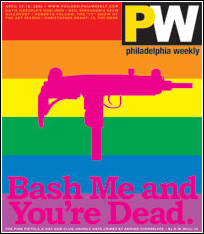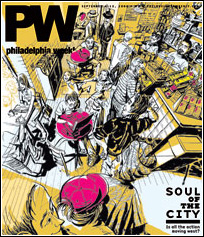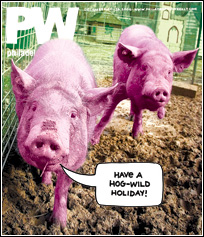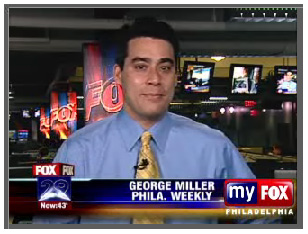National Park.
Why Chan Ho Park still wants to take the mound.
From the summer 2009 two.one.five magazine.
Before game time on a mild April afternoon, fans crowd the first base railing at Citizen's Bank Park, clamoring to meet their heroes. Children wave hats and photos and baseball cards, pleading for autographs from Phillies Jamie Moyer and Jimmy Rollins. They beg, squeal and shove sparkling white baseballs at the smiling players whose crisp white uniforms emanate an angelic glow in the bright afternoon sun.
From the dugout emerges Chan Ho Park, the Phillies' fifth starter, who'll be pitching his first home game for his new team on this Sunday afternoon.
With his head down, Park trots toward the outfield bullpen to warm up. He passes fans desperate for attention but they largely ignore him. Instead, they continue to hound Moyer and Rollins, two stars of the previous year's World Championship team.
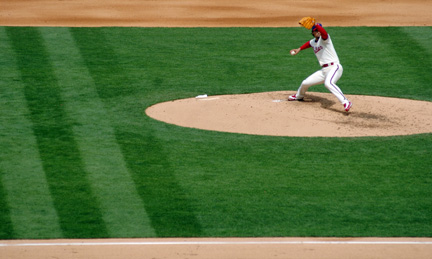
Only a pair of giddy Korean-American young men - one wearing a Chan Ho Park Phillies jersey - bounce and flail their arms and shout in Korean. When Park looks at them and offers a modest wave, it's as if the Beatles had just landed on the tarmac at JFK.
Around the bullpen, however, the scene is significantly different. The crowd along the railing surrounding the pitchers' warm-up area is two or three people deep with dark-haired Korean and Korean-American fans eagerly awaiting Park. They hold banners with Korean writing, chatter excitedly, shoot video and wave to the stoic Park when he arrives.
"He's the most famous Korean Major League player," explains Seo-Hee You, a Korean-native who's now a post-doctoral researcher at the University of Pennsylvania. "This is a big chance for him, to see if he can be a big time pitcher again like before."
Like many of the others along the railing, You snaps photos of Park and has her picture taken while the 6'2" right-hander throws behind her in the pen.
Fifteen years ago, Park was the first Korean player in the Major Leagues and the first Asian-born player to play here in nearly three decades. He helped launch the Asian Invasion that opened the door for future stars like Hideo Nomo, Ichiro Suzuki, Daisuke Matsuzaka and Shin-Soo Choo.
Even now, in the latter stages of his career, Park remains a hero to many, if not an entire nation.
"He makes us proud of Korea, proud of ourselves," You says.
Park is acutely aware of this. And he carries the weight of that pride with him during every game he pitches.
***
Chan Ho Park was a long shot to be the Phillies fifth starter when he entered spring training this year. It had been three seasons since he was last a regular starter, and nine years since his career year - when he won 18 games for the Dodgers.
At 35, he was no longer the flame-thrower he was when he first entered the league. Now a wily veteran, he believed he could still get batters out through finesse and a fastball in the low 90's. But it was more than cashing another Big League paycheck or personal glory that spurred him in his battle to win that fifth starter's spot on the team. His country, he felt, needed him.
"If I'm a starter, people in Korea will know when to watch television," Park says in his slightly fractured English. "I pitch so they can enjoy baseball. Right now, the economy is very bad in Korea. If I pitch good every five days, people will be happy and they'll forget about no money or no jobs."
Because Korea relies so heavily on exports for it's economy and the world isn't buying much these days, some experts predict the global recession will linger in Korea even as other economies begin to recover.
Park, who was exempted from mandatory military duty because he was a star athlete, is trying to help ease his countrymen's pain.
"That's why I play on a Major League team," Park says. "So I can give something back to the country and people."
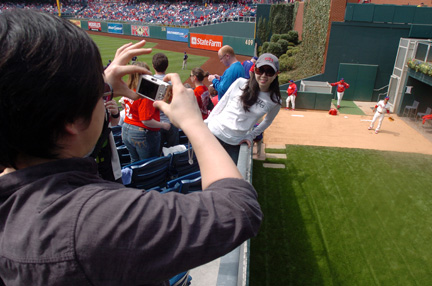
The sentiment would bring tears to Bud Selig's eyes. The commissioner of baseball is constantly pushing the sport in the global marketplace - trying to promote baseball and market it as a valuable product all over the world. The future of baseball, he seems to believe, is global.
America's treasured pastime, however, is often achingly slow to change. And the international revolution that started with Park in 1994 still faces serious resistance, especially here in Philadelphia where change seems to come only after a prolonged fight and much (mostly metaphoric) spilled blood.
***
Park stands silently on the mound as the cacophony of the sell-out stadium reaches a chaotic apex. He has a strong chin and high cheekbones, the good looks that have sold Nikes and made girls in Korea swoon. His legs are long and strong, the source of his power.
He rocks back, raises his hands in the air, lifts his left leg to his chest, twists his torso back, tucks his arms behind his leg and then explodes forward, unleashing the ball - a 90-mph sinker that drops below Jody Gerut's knees for a called strike.
When Gerut, the Padres centerfielder, goes down swinging on a 2-2 slider for the first out of the game, the stadium erupts - especially section 131, where Kenny Kang and 15 of his friends and family dance in the aisle, high-five, hoot, wave signs and pump their fists into the air.
"I've loved him ever since I knew who he was," says Kang, 18, a lifelong Phillies fan from Lansdale with family roots in Korea.
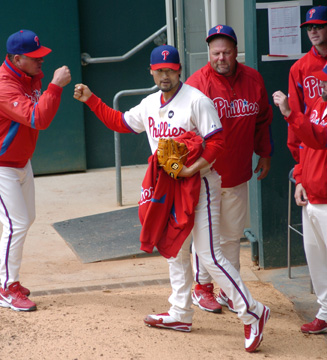
Clad in a blue World Series championship T-shirt and a red Phillies fitted hat, Kang says he remembers seeing Park pitch at Veteran's Stadium when the Dodgers were in town in the late 1990's.
"My family met him and he autographed a baseball that I still have," he says. "We made the Korean newspapers - a picture of us with Chan Ho."
It is perhaps difficult for a typical American sports fan to fully grasp the kind of all-out mania with which his fellow countrymen greeted Park's every start. During that time, legions of Koreans and Korean-Americans followed Park from stadium to stadium, and every game he pitched was broadcast live in South Korea. Millions of people there stopped everything and cheered, regardless of when the games were aired
"Back in 1998 and 1999, everybody was watching," Park says matter-of-factly after the game. "Even 3 o'clock, 4 o'clock, 5 o'clock in the morning - everybody was watching. That was a big deal."
***
Chan Ho Park was raised in the small city of Gongju, South Korea, surrounded by lush green mountains and fertile valleys. He became a national sensation as a teenager when his fastball reached the upper 90's with regularity.
When he was 17, Park visited Los Angeles with a national All-Star team. It was his first experience representing his country, and his first trip out of Korea.
In California, they competed in an international tournament. Park won all three of his starts and Korea won the tournament - with victories over Team USA and Japan.
The Korean team visited Universal Studios where they watched the Star Trek Adventure and the Wild West Shootout, even rode the tram around a New York set while King Kong shook the Earth.
That evening, the team went to Dodger Stadium, the 56,000-seat shrine to baseball with the San Gabriel Mountains looming in the distance. Daryl Strawberry roamed right field. Eddie Murray manned first base. Mike Scioscia called the pitches behind the plate.
"Dodger Stadium was like a dream, like a movie," Park remembers. "I felt like we didn't leave Universal Studios. It was so pretty."
He watched in awe as Dodgers' pitcher Kevin Gross blew a one run lead in the 9th inning against the Padres but the Dodgers came back to win in extra innings.
Park bought a souvenir - a blue Dodgers jacket. Back in Korea, he wore the jacket nearly every day for the next few years.
"I start dreaming about taking the mound, pitching at Major League stadium," he remembers. "I didn't know I was going to do it. I was just dreaming, you know."
In 1994, during his second year at Hanyang University, Korea's premier baseball factory, the Dodgers drafted Park.
Soon afterward, he was sporting a team-issued Dodgers jacket, Dodger Stadium was his home field and Kevin Gross was his teammate.
***
On this beautiful day, the Padres score three times in the third inning - on a bunt single, a botched fielding play and some smart, situational hitting. In the fifth inning, Park delivers a loose slider to Adrian Gonzalez who drills the ball into the right field bleachers for a solo home run.
As Gonzalez trots around the bases, Park broods behind the mound and punches his fist down in the air, a rare show of emotion. After the next batter, Chase Headley, flies out to centerfield to end the inning, Park mopes to the dugout, his head down, shoulders slumped.
The Koreans and Korean-Americans in section 131, however, continue to cheer and celebrate.
"I'm a Chan Ho fan," says Young Seok Choi, a Korean-native who now lives in Baltimore. He sports a Chan Ho Park number 61 replica Phillies jersey, which was custom made for $140. "He pitched many exciting games for Korea, We hope he can play starting pitcher, and pitch in World Series."
When Park's spot in the batting order comes up in the bottom half of the inning, pinch hitter Miguel Cairo steps in for Park. Cairo grounds out weakly to third to end the inning.
The Phillies are down 4-0, and Park retreats into the bowels of the stadium.
J.A. Happ takes the mound in the top of the sixth.
"If Park was that good," a heavyset Phillies usher says to a fan standing in the aisle near section 131, "don't you think he'd still be with the Dodgers right now?"
***
The longstanding logic in American baseball had it that white guys always played it best. Racism, while not written into policy, was an understood, unspoken gentleman's agreement that team owners abided by until the middle of the 20th century.
"They (the owners) didn't want black players," says Rich Westcott, 70, a Phillies historian and author of 19 books, including five about the Phillies. "They insisted that there were no black players signed by anybody. Go back to the '30s and '40s and there were some owners that wanted to sign black players but they just weren't allowed to."
Finally, Branch Rickey, the president and general manager of the Brooklyn Dodgers, signed former UCLA four-sport letter winner Jackie Robinson, an African-American, in 1945.
When Robinson joined the Dodgers in 1947, therefore integrating baseball, the reaction was immediate and hostile: fans sent death threats and hurled racial comments, teams threatened boycotts, and players viciously tried to harm Robinson in the field. Philadelphia, as it happened, was among the nastiest cities.
"You just can't bring that ni**er here with the rest of your team, Branch," Phillies then general manager Herb Pennock informed Rickey, on the eve of Robinson's first road trip to Philadelphia, according to Scott Simon's Jackie Robinson and the Integration of Baseball. "We're just not ready for that sort of thing."
Pennock threatened to not play his team if Robinson was in the Dodgers' lineup. Rickey reportedly responded that he would gladly accept the forfeited series. The Phillies ultimately backed down.
But when the Dodgers tried to register for their rooms at their regular Philadelphia residence, the Benjamin Franklin Hotel, the hotel refused to register Robinson - allegedly because of Pennock's influence. Robinson was forced to stay at a black-friendly hotel, several blocks from his teammates.
Thereafter, the Major Leagues began to slowly, often painfully, integrate - Larry Doby joined the Indians three months after Robinson joined Brooklyn. Hank Thompson joined the St. Louis Browns two weeks after Doby's arrival.
The first African-American player to appear in a Phillies uniform, however, was not until a decade after Robinson's debut. John Kennedy suited up for five games in 1957, went hitless in two at-bats, then was dispatched, never to play in the big leagues again.
Of the original 16 Major League teams, only the Detroit Tigers and Boston Red Sox integrated after the Phillies - who maintained segregated spring training facilities until 1962. The first Phillies regular African-American star was Dick Allen, and his tenure in the city was marred by overt racism.
Latino players had arrived in the big leagues as early as 1902, though full integration didn't occur until the post-Robinson era of the 1950's.
The first Asian player, Masanori Murakami, arrived in 1964 as part of an exchange program with the Japanese pro league. When Murakami decided he wanted to stay after his brief exchange program, a tense rift was born between the Japanese league and the Major Leagues.
Murakami returned to Japan after the 1965 season, and no other Asian-born players would play in the American big leagues until Park signed with the Dodgers in 1994.
***
"Even now, the Asian players the Phillies have had, they didn't scout them on their own, bring them through their system," says Westcott, the author and a former official scorer at Phillies games.
The Phillies traded for Tadahito Iguchi in 2007 after Chase Utley broke his right hand. The Tokyo native was the first Asian-born Phillie. In 45 games, he batted .304 and fielded second base superbly, helping the team win the National League pennant. After the season, the Phillies failed to re-sign Iguchi.
So Taguchi, another Japanese player, joined the team for the 2008 season. Expected to be a pinch-hitting specialist, Taguchi disappointed fans by going hitless in his first 16 pinch-hit appearances. He wound up with 20 hits in 91 at-bats for the season and was released on the day of the Phillies World Series Championship parade.
Park signed as a free agent last December. The Phillies opened the 2009 season with 17 white players, five Latino players, two African-Americans and one Asian.
The team has never had a full-time scout in Asia - where the sport is often considered by Americans as being played at a lower level. Currently, the Phillies send their scout from the Northwest US to occasionally see players in Asia. Which means the most convenient way for them to see Asian talent these days is in the World Baseball Classic.
"It gives us an opportunity to see some of those teams and we get some of our pro scouts into those games," Phillies general manager Ruben Amaro Jr. says. "It all depends on what our needs are from year to year, how important we think it is to go and scout those games."
While commissioner Selig tries diligently to market the game in foreign markets - with recent regular season games played in Japan, Mexico and Puerto Rico - many within the ranks of American baseball are resisting the international idea, especially when it comes to the World Baseball Classic.
"We'll always support the WBC," Amaro says. "We'll support our players playing in it. We just have to find the right formula to make sure our players are prepared for our season. That's really the most important part."
The two previous WBC tournaments - in 2006 and 2009 - have been played during spring training, and many feared that interrupted the players' routines.
"It is special to be asked to represent your country," says Shane Victorino, the Phillies centerfielder who played for Team USA. "You want to be there. But your main priority is to represent your Major League team."
Carlos Ruiz intended to prepare for the Phillies season and not play for his homeland, Panama. Then Martin Torrijos, the president of Panama, called Ruiz and asked him to reconsider.
"I couldn't say no to him, you know?" Ruiz says.
Park, who had to fight for a position with the Phillies during spring training, declined to play for Korea this year.
"For Chan Ho to have given up that opportunity, to work as hard as he did to compete to be one of our starters, that's dedication," Amaro says. "In a way, I think he regrets not being able to participate but that's all part of the timing issue."
***
Park watches the remainder of his first Phillies home-game start from the locker room. Happ, who was Park's primary competition for the final spot in the rotation during spring training, pitches three scoreless innings. Chase Utley hits a two-run homer in the sixth. Jimmy Rollins hits a pinch-hit solo shot in the eighth but the Phils still trail 4-3.
In the bottom of the ninth inning, Raul Ibanez hits a two-run, walk-off homer to win the game. The last minute heroics get Park off the hook - his mediocre performance is nearly forgotten in the glorious moment.
"I felt good," Park says after the game, surrounded by reporters and television cameras in the locker room. "The power hitting picked up my game. I think I pitched good, kept the game close. I didn't pitch great but it was close and we came back, you know."
But when Ibanez enters the room - still wet from the shower and wrapped in a towel - the media briskly move toward him, away from Park.
***
"Being from a foreign country, you want to do good," says Phillies skipper Charlie Manuel. "You want to show people how good you are."
Manuel knows this all too well. He hit 189 home runs and drove in 491 runs from 1976 through 1981 in Japan's pro league. The free-spirit, good-old boy from Virginia was among the best of the Americans to play in Japan during that era.
"When I was playing in Japan, I had a lot of things on my mind," Manuel continues. "You're in a different world over there. I had to show them how good I could play and how deserving I was to be a regular player and everything."
He wasn't playing for national pride, he says. He didn't represent America, or even American baseball.
"They invited me and paid me money to play in their country and I wanted to do good," he says. "Everybody might be different but that's how I looked at it."
***
By the time Park leaves the stadium, it's nearly 6:00 on Sunday evening. In Korea, it's almost 7:00 am Monday, and Park's fans there are probably just waking.
He saw the Korean fans in the stands today, Park says, and they energized him. He knows more will come throughout the season. He's heard of fan clubs forming - his supporters may arrive by the hundreds for each of his home starts.
Of course, that's assuming he's able to stay in the rotation, which isn't guaranteed given his performance.
Park wishes there were more of his countrymen playing in America. There were only three Korean-born players on Major League rosters to start the season.
"Fifteen years ago, I was the initial person to open up the door for Asians," Park states. "Me and Hideo Nomo. We did very well. Not many players from Korea come to play in the major leagues and that makes me very sad."



